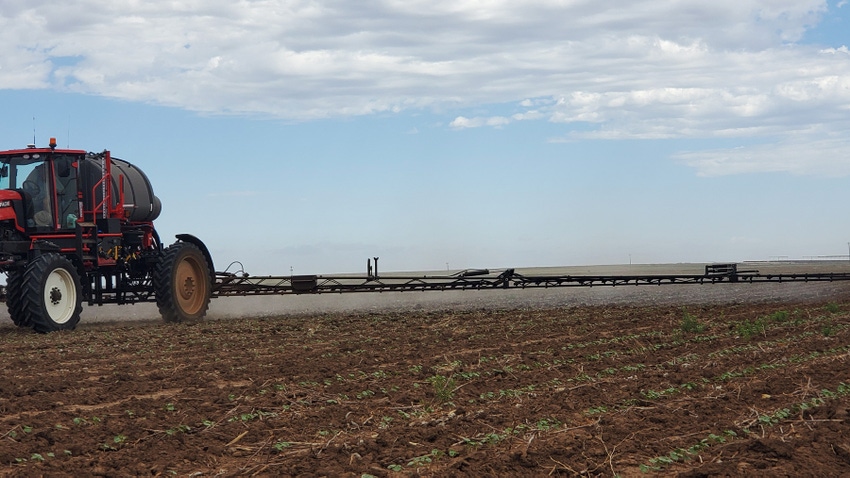
Cotton and soybean producers who use dicamba products XtendiMax, Engenia and Tavium received some good news for Valentine's Day, as the Environmental Protection Agency issued an existing stocks order, ensuring farmers will have access to dicamba products.
This move comes on the heels of a U.S. District Court of Arizona ruling to vacate the 2020 registrations for dicamba products, Feb. 6, 2024, and as South Texas producers were about to begin planting.
While the existing stocks order brings some consolation, Jeff Nunley, South Texas Cotton & Grain Association executive director, says it also comes with caution.
“We are glad EPA made the right decision by issuing an existing stocks order for over-the-top (OTT) dicamba products,” Nunley told Farm Press. “This should provide some relief for our South Texas farmers who have begun planting and are locked into the decisions they made for planting seed and weed management programs for this season.
“Farmers will still need to follow product labels and ensure they receive auxin herbicide training before applying the product. With the registration for OTT dicamba still in limbo, producers need to be especially good stewards of these products.”
Producer and 2024 Southwest High Cotton winner, Richard Gaona, expressed his relief describing EPA’s order as “great news… understanding that producers had already purchased OTT dicamba and dicamba tolerant cottonseed.”
Weed Scientist Peter Dotray, Texas A&M AgriLife and Texas Tech University, echoed his sentiments. “EPA believes millions of gallons of OTT dicamba are already in the possession of growers or within trade channels,” he says, adding the existing stocks order allows producers to use the product as it’s been used in the past.
“And now it gives us about a year to figure out what to do next year, if it turns out we have zero opportunities to use dicamba in 2025. The use of soil active herbicides will continue to be of significant value in cotton and soybean in 2024 and beyond.”
Dicamba distribution dates
As for this season, Dotray urges growers to pay close attention to their state and crop's limited sale and distribution dates. “In Texas, the end date of sale and distribution for existing stocks of Xtendimax, Engenia, and Tavium for use in dicamba-tolerant soybean is May 31, 2024. The end date for use in soybean is June 30. The end date of sale and distribution of these over-the-top dicamba herbicides in dicamba-tolerant cotton is May 31, 2024, and the end use date is July 30.” (The same dates apply for Oklahoma and New Mexico.)
“This Order is designed to assist growers who have already invested in dicamba-tolerant seeds by implementing stringent guidelines for application to avert misuse and subsequent harm to non-target crops and ecosystems. Growers must comply with previously approved 2020 labeling to minimize environmental harm.”
Dotray stressed the importance of not over purchasing. “There’s no need to stockpile. Producers need to purchase what they’re going to use this year because even if there is some change, these current labels will expire at the end of the application period for soybeans and cotton. Any hope that’s there’s a chance to spray dicamba in 2025, my understanding is those will have to be new dicamba labels.
“After the 2024 use dates have expired, any unused products will be considered illegal to use.”
Registrant distribution
Registrants are not included in the existing stock order, says Scott Nolte, Texas A&M AgriLife State Extension weed specialist. He notes the first paragraph of page 2 of the order, which reads, “Under the provisions of the District of Arizona’s order, as of February 6, 2024, it is unlawful for the registrants—Bayer CropScience LP, BASF, and Syngenta Crop Protection, LLC—to sell or distribute these products except for the purposes of proper disposal or lawful export. In light of the court’s order, EPA is issuing this existing stocks order to authorize limited sale and distribution of existing stocks that are already in the possession of persons other than the registrant.”
Nolte expects greater clarification on this topic in the coming weeks.
Difficult timing
While Plains Cotton Growers commends EPA for their response, the organization, whose coverage area is responsible for producing about 35% of the nation’s cotton, admits the initial ruling adds insult to injury. “This vacatur ruling has come at a time when producers have already started making decisions regarding seed and crop protection tools for the 2024 cotton crop season, and, with the amassed challenges they’re already facing this year, they need to be able to maximize their production potential," says Kody Bessent, PCG CEO. "Our producers already need relief from a volatile market and uncooperative weather patterns. They shouldn’t have to deal with uncertainty in regulatory issues, too.”
Read more about:
DicambaAbout the Author(s)
You May Also Like






